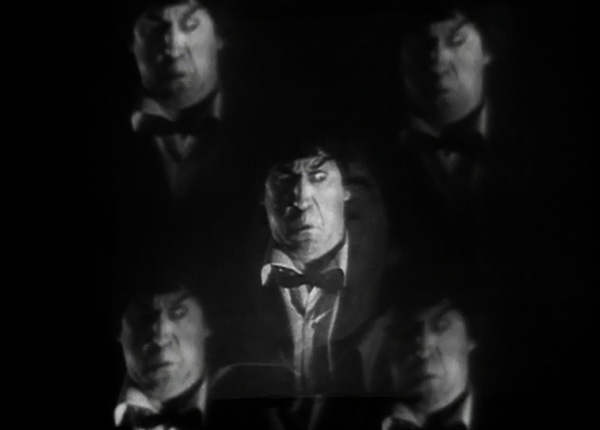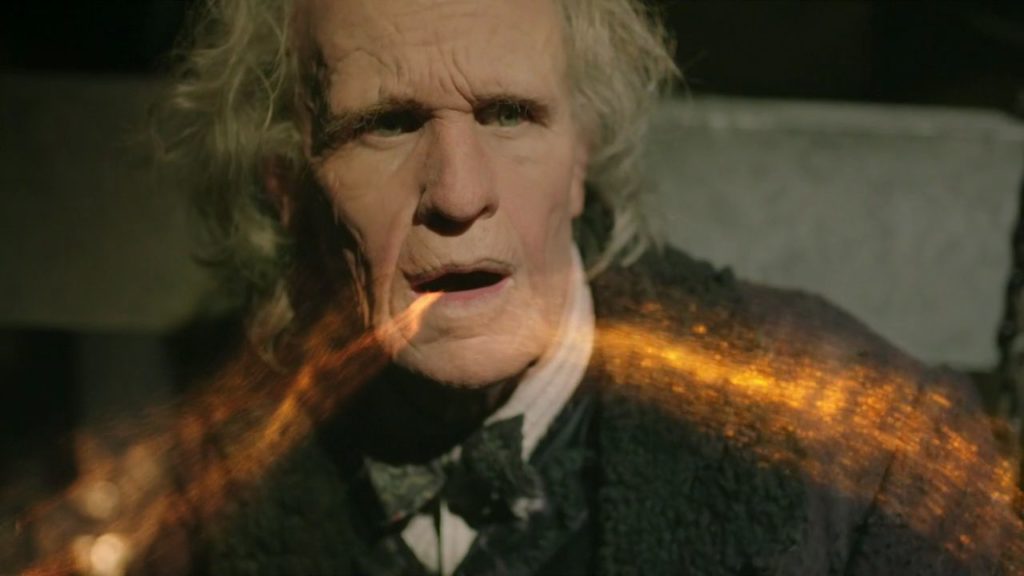Much has changed in the Whoniverse over the last few years. The Doctor has lived so many lives now – indeed, because of the revelation in ‘The Timeless Children’ it may not be possible to count them all! (Warning: spoilers ahead…) So if you’re wondering what the future holds for the Doctor’s future regenerations (or lack thereof) then stay tuned. Is the Thirteenth Doctor the last? Has she reached her limit? Or will her future selves be thwarted by a far deadlier enemy: cancellation?!
We’re about to find out…
No! Not the ratings!
The axe has hovered over the Doctor’s head many times. As the credits rolled at the end of The War Games in 1969, there was a very real possibility that our favourite time traveller would not be returning. The viewing figures had dropped to a worrying 3.5 million during the transmission of part eight, and a huge question mark hung over the show’s future – particularly as the Second Doctor seemingly dies at the end of episode 10, with his transformation into a new body going unseen.

Then there is the dreaded hiatus of 1985 / 86, when the powers-that-be pulled the plug during the Sixth Doctor’s first full season at the helm of the TARDIS. Of course, Doctor Who did return in September 1986 – albeit in a curtailed season – and even then the show’s future was by no means certain. In fact, the producer John Nathan-Turner decided against a cliffhanger ending to the epic Trial of a Time Lord serial for fear that it would provide ‘the perfect excuse’ to give the good Doctor the boot.
Sadly, the boot did come in autumn 1989, opening the gates to what’s become ominously known as The Wilderness Years. During this time, there was only one televised story (the TV Movie in 1996, starring Paul McGann) and eager fans had to wait until 2005 before they could hide behind the sofa once again…
This brings us into the New Who era, to which the Thirteenth Doctor belongs, and although the ratings have declined in the last few years, the history of Who has shown – time and again – that the good Doctor is a survivor.
But… the regeneration limit?
If you know your Who history, you’ll be aware that the Doctor’s regeneration limit was officially capped in the 1976 story ‘The Deadly Assassin,’ when it was revealed that Time Lords could not regenerate more than 12 times – leading to a limit of 13 incarnations. Now, we’ve seen a few exceptions to this over the years; the Doctor’s enemy the Master has shown ably that he can adopt new bodies, even at the end of his 13th life (take a look at ‘The Keeper of Traken’ or the TV Movie.)

Moreover, in ‘The Five Doctors,’ the Time Lords confirm that they have the power to grant whole new life cycles (as in, another set of 13 lives) seemingly at a whim, and this is the offer they make to the Master in exchange for his help.
Indeed, true to their word, the Time Lords demonstrate their life-giving abilities in ‘The Time of the Doctor,’ when they grant new regenerations to the dying Doctor. Thus, Matt Smith regenerates into Peter Capaldi – marking the start of a new life cycle – and this means, technically, that he is the new First Doctor. And when Peter Capaldi’s Doctor dies in ‘Twice Upon a Time‘ he regenerates into Jodie Whittaker’s Thirteenth Doctor, who’s technically the new Second Doctor. Keeping up?
So, although we can’t be certain how many more lives Whittaker’s Doctor possesses, it’s fair to say that there are a few regenerations left in the tank, if she truly was granted a brand new life cycle. Simple, right?
Wrong!

We now face a much tougher question – not ‘is the Thirteenth Doctor the last?’ But rather – ‘is the Thirteenth Doctor the Thirteenth Doctor?’ And, ‘is there even a regeneration limit at all?!’
In ‘The Timeless Children,’ all of Who canon was turned on its head by the Master’s revelation that the Doctor had – in fact – already existed in a myriad of forgotten incarnations, even a myriad of regeneration cycles. The Master acknowledges that the usual life limit for Time Lords is 12 incarnations, but the Doctor is actually an exception to this rule owing to her own inherent biology. Simply put – it’s now very difficult to determine which Doctor Jodie Whittaker’s Doctor actually is, or how many lives lie ahead of her. It may well be that she can continue to regenerate ad infinitum, and this is certainly implied over the course of ‘The Timeless Children.’
But then – if this is true – it wouldn’t make any sense for the Time Lords to have granted Matt Smith’s Doctor a brand new cycle in the closing moments of ‘The Time of the Doctor,’ right? Because, according to ‘The Timeless Children,’ the Time Lords are already aware of the Doctor’s special regeneration abilities which – on the face of it – are limitless. So Matt Smith’s Doctor wasn’t in any danger at all.
Hmm. We’re going to need a Big Finish box set…
So is the Thirteenth Doctor the last?
As you can see, when a it comes to addressing this question, there really is no simple, straightforward answer.
Except ‘probably not.’
With Doctor Who canon shrouded in mystery, the simplest answer is this: the Doctor will continue to regenerate as long as someone, somewhere, wants her adventures to continue.
Tell us what you think. Have we missed any crucial details in this piece? Do you have your own theories about the Thirteenth Doctor? Could she, in fact, be the very last one? Let us know in the comments below!


Personally, I found that regeneration into another gender was not in keeping with the Dr. Who lhistorical format. Nowhere is it even hinted at in past episodes that a gender change would, should, or has occured. So I look at Jodie Whittacker’s doctor as a new series… a way out of the past historical canon to a path of multiple gender-races of doctors. It’s almost as if the Doctor now has slipped into a new time stream or alternative dimension where certainly multi-gender Doctors have existed.
After Peter Capal;di, I pretty much felt that the traditional seires had ended.. and that Jodie is a new regeneration into a different path, or time stream. Part of the fun of Dr. Who is the hconnected historywith the past docters and support charcters, I had hoped that the appearnce of River Song might have been the gender connection, and I wish that River Song could have had a more extenisve role in the history of Dr. Who. I really enjoyed her presence and her character.
But now, there is no historical connection to River Song and Jodie Whittaker that has ever been even hinted at in any episode, I have to take it as a new series with different challenges and different enemies yet to be discovered. As the Daleks and Cybermen were the signature villain connections to Dr. Who, the new Doctor Who (Jodie) has yet to find hers. So I find it difficult to connect all of the past doctors to the regeneration through Jodie Whittaker. It’s time to depart, and build a new series, a new charceter. and a new time line with a new history focused on more recent themes that will impact our future planetary situation.
Yes I suppose we have the freedom as viewers to pick our own beginnings / endings for the Doctor’s adventures if we want – or even decide for ourselves what we consider to be canon! Thanks for the thoughts Joe
Loved the read 🙂
Giving the new regeneration energy to 11 could have been done despite knowing that The Doctor has unlimited regenerations. However, I would argue that (I would have to rewatch The Timeless Children to completely confirm) that only the higher-ups of Gallifrey (Rassilon etc) would actually know about that seeing as The Master had to search the depths of the Matrix just to find this out. This would suggest that most Time Lords would still believe The Doctor to have the regeneration limit- perhaps those who granted those new regenerations.
As for The Doctor “needing” those new regenerations. My personal head-cannon would either be that they experimented on her at a young age and managed to cap her regenerations to 12 after the presumable final mind-wipe before the 1st Doctor. OR, there is a lot in sci-fi and even IRL science that shows the power of the brain tricking the body, and therefore it could be that because The Doctor believes she only has this many regenerations left, her mind tricks her body into thinking that- so much to the point that she would actually have died in The Time of the Doctor. She has, to be fair, had lived over 2000 years or something at that point believing she would die at that point.
I was worried going into The Timeless Children at how destructive they’d be towards the original cannon, but in my opinion it was actually pulled off really well. Even down to the detail that the First Doctor wants to run from Gallifrey- perhaps from subconscious memories or being tortured and his mind relating his home to pain (even if it takes him 2000 years to work out why)..
Anyways, I look forward to future posts!
Aaron 😀
Very good points Aaron! Yes I can definitely believe that the Doctor is unaware of his / her true regeneration limits so I don’t see a plot issue there. And what you say about only the high-ups being in the know – that makes sense. Although to me I couldn’t imagine anyone other than the high-ups granting (or at least authorising) new regeneration cycles… Unless of course the truth about the Doctor was never handed down, and just remained buried in the Matrix.
But saying THAT – the Doctor and the Master spend a long time arguing about “why would they lie to us?!” – even prompting the Master to destroy Gallifrey. This implies that the knowledge about the Doctor was commonly held among the elite, even in modern times.
Aaaaargh my head 😛
So here’s something that I’ve kinda noticed/figured out when it comes to what’s canon and not canon in Doctor Who. The show kind of acts like it’s in a state of quantum superposition. It’s both canon and not canon at the same time as the show both continues old plot lines, but ignores or if I remember correctly, outright retcons some of those plot lines at will. So, like earlier commenters have pointed out, it’s kind of up to us at a personal level as to what we decide is and isn’t canon.
(So basically the shows timeline is a disaster and we should just have fun with it and see where it takes us.)